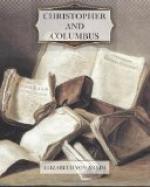“You can’t be Christopher,” said Anna-Rose, giving herself a shake, for here she was thinking of her mother, and it didn’t do to think of one’s mother, she found; at least, not when one is off to a new life and everything is all promise because it isn’t anything else, and not if one’s mother happened to have been so—well, so fearfully sweet. “You can’t be Christopher, because, you see, I’m the eldest.”
Anna-Felicitas didn’t see what being the eldest had to do with it, but she only said, “Very well,” in her soft voice, and expressed a hope that Anna-Rose would see her way not to call her Col for short. “I’m afraid you will, though,” she added, “and then I shall feel so like Onkel Nicolas.”
This was their German uncle, known during his life-time, which had abruptly left off when the twins were ten, as Onkel Col; a very ancient person, older by far even than their father, who had seemed so very old. But Onkel Col had been older than anybody at all, except the pictures of the liebe Gott in Blake’s illustrations to the Book of Job. He came to a bad end. Neither their father nor their mother told them anything except that Onkel Col was dead; and their father put a black band round the left sleeve of his tweed country suit and was more good-tempered than ever, and their mother, when they questioned her, just said that poor Onkel Col had gone to heaven, and that in future they would speak of him as Onkel Nicolas, because it was more respectful.
“But why does mummy call him poor, when he’s gone to heaven?” Anna-Felicitas asked Anna-Rose privately, in the recesses of the garden.
“First of all,” said Anna-Rose, who, being the eldest, as she so often explained to her sister, naturally knew more about everything, “because the angels won’t like him. Nobody could like Onkel Col. Even if they’re angels. And though they’re obliged to have him there because he was such a very good man, they won’t talk to him much or notice him much when God isn’t looking. And second of all, because you are poor when you get to heaven. Everybody is poor in heaven. Nobody takes their things with them, and all Onkel Col’s money is still on earth. He couldn’t even take his clothes with him.”
“Then is he quite—did Onkel Col go there quite—”
Anna-Felicitas stopped. The word seemed too awful in connection with Onkel Col, that terrifying old gentleman who had roared at them from the folds of so many wonderful wadded garments whenever they were led in, trembling, to see him, for he had gout and was very terrible; and it seemed particularly awful when one thought of Onkel Col going to heaven, which was surely of all places the most endimanche.




